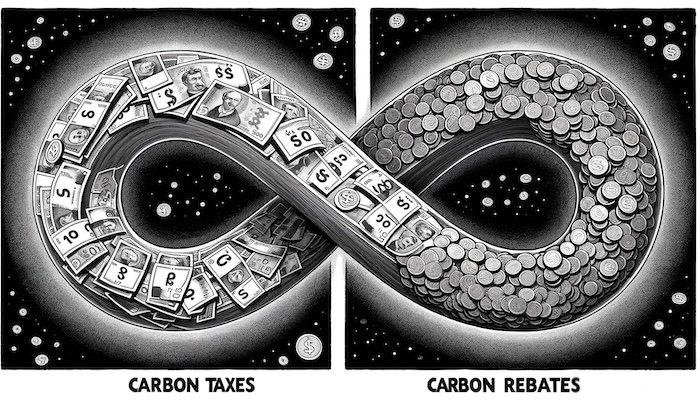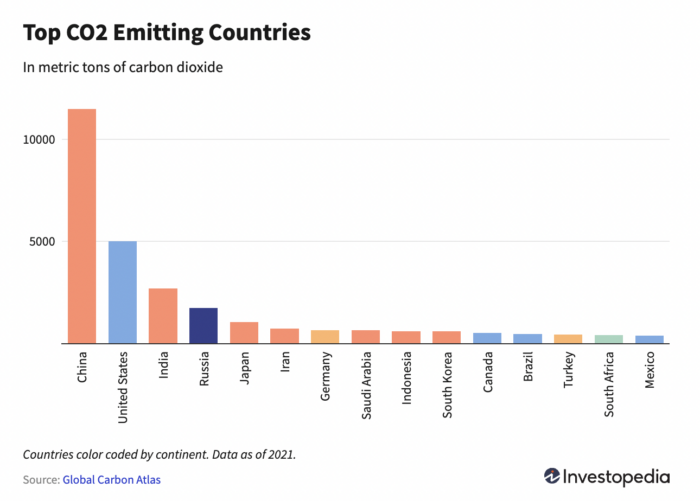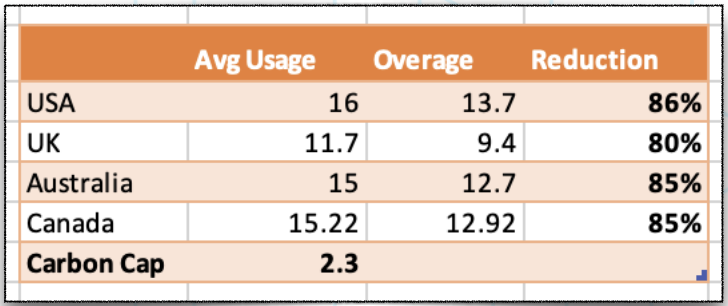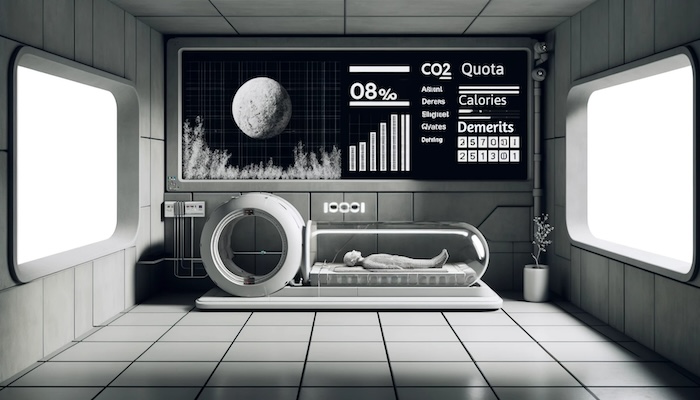(Featuring: The Three Big Lies of “Climate Action”)
Everybody talks a good game when asked about environmental concerns. But they underestimate what real “climate action” will cost them, personally, and they’re prone to balking when they figure it out.
In 2018, The Energy Policy Institute at the University of Chicago conducted a survey of 1,202 people asking them if they thought climate change was an issue, and if so, how much were they willing to contribute, out of their own pockets, towards “fixing it”:
- 71% of the respondents said that climate change was a reality, and most of those thought human activity was largely responsible for it.
- 57% said they’d be willing to spend $1/month, or $12 annually.
- 23% were willing to go big: $40 a month, in order to “fix” climate change.
A more recent study of ten European countries in 2021 found that most people feel as though they are already doing their part to live a climate conscious lifestyle – and further – they are individually doing more than those in the media, or their governments (hold that thought).
In other words, while most respondents believed that there was an impending climate crisis, they also believe they had already made all the personal lifestyle adjustments they’ll need to make in order to address it.
These attitudes are pretty typical of a populace who has already undergone massive conditioning by the media and academia around climate alarmism, but who otherwise live largely insular, bubble-wrapped lifestyles and think food comes from Uber Eats.
They have no idea that that climate targets, like “netzero” or Agenda 2030 will cost more them more than a few hundred bucks a year, per person, to “fix”.
Even with carbon taxes becoming more prevalent – citizens think the extent of the impact on their lives are the economic pressures of them inexorably rising (here in Canada, the carbon tax went up 23% on April 1st, the same day all federal Members of Parliament got a pay raise).
That’s bad enough – but people are still completely unprepared for what has already been decided from on high for their personal destinies:
Climate Action requires a complete re-ordering of society and civilization itself.
“De-carbonization” requires “#degrowth”, a euphemistic hashtag that really means forced austerity on all of humanity – save for those apparatchiks imposing it on the rest of us.
The Big Lie of climate alarmism is threefold:
- That the climate goals of netzero and decarbonization can boost the economy and increase prosperity for all
- That achieving said goals will afford us control over the climate and alter the planetary physics of the earth itself
- That this is all “settled science”
Let’s look at each of these in order:
Big Lie #1: Pursuing Netzero will boost prosperity
Many politicians like to gaslight us that there is a way achieve netzero targets in an economically beneficial manner. A good example, again here in Canada – is the carbon tax.

Everybody pays the carbon tax – on gas, on flights, on heating their homes, etc. Most households get a “carbon tax rebate” – which is invariably, for less money than they have paid in carbon taxes. This is borne out in countless analyses on this, including the government’s own Parliamentary Budget Office report, which found that:
“most households will experience a net loss of income from the federal carbon tax, even after rebates.
Specifically, in fiscal year 2024-25, 60 per cent of households in Alberta, Ontario, Saskatchewan, Newfoundland and Labrador, Nova Scotia, Prince Edward Island and Manitoba will pay more in carbon taxes than what they receive in rebates, after accounting for both direct and indirect costs of the carbon tax. By 2030, 80 per cent of households in Alberta, Ontario, Manitoba, Nova Scotia and P.E.I. will be worse off, as will 60 per cent of households in Saskatchewan and Newfoundland and Labrador.
Indeed, according to the PBO estimates, the carbon tax will cost the average Canadian household between $377 and $911 in 2024-25—even after rebates, with Albertans being the most affected. As the carbon tax escalates annually, the financial burden will intensify. By 2030, the carbon tax’s average net cost for Canadian households will rise to $1,490 in Manitoba, $1,723 in Saskatchewan, $1,820 in Ontario and $2,773 in Alberta.”
— Via Fraser Institute
Yet the Trudeau government frames the rebate as “free money” for Canadians, and demonizes anybody who wants to “Axe The Tax” as though they are trying to take money away from taxpayers.
The Libs are going keep doubling-down on the nonsensical claim that #AxeTheTax would actually take money away from Canadians.
It’s an IQ test and if you believe that, you failed. https://t.co/KRDxETQqy6
— Mark Jeftovic, The ₿itcoin Capitalist (@StuntPope) April 6, 2024
If decarbonization was economically viable, then it would be happening on its own, without governments and the corporate media relentlessly brainwashing us to do it.
For example, we would probably have mini-nuclear reactors all over the place by now if private industry was given some latitude to implement it.
Instead we have millions of hectares of wind turbines that are only “green” if you can amortize the carbon inputs over 30 or 40 years. Alas, the typical wind turbine is cooked within a decade (that’s if they don’t explode first). Apparently they can’t be recycled, either. It’s actually making the situation worse.

Big Lie #2: Achieving Netzero will enable us to control the planet’s climate
There has perhaps never been a more grandiose and categorically impossible vision for humanity than the one where technocrats and experts can massage the trajectory of global climate through the judicious employment of carbon taxes, personal carbon footprint quotas and forced collectivism.
On the planetary level – it makes no difference if a country like Canada decarbonized 100% – compared to the emissions of China alone. Right now they’re lighting up two new coal fired plants every week. Wake me up when they decarbonize.

Not to mention numerous other countries who have no intention of foregoing their shot at economic prosperity at the behest of already an affluent (not to mention overly sanctimonious), West…
“Let me stop you right there…”
Caribbean nation Guyana is booming after discovering oil. BBC’s Stephen Sackur puts it to President @presidentaligy; lobbyists say oil is bad for the climate.
Dude wasn’t having it. Mans was ready! pic.twitter.com/awy8OPIW2q
— Ranga.🇿🇼 (@RangaMberi) March 29, 2024
The discrepancies in values and aims between nation states already makes the 100% conformity that climate action requires a non-starter.
That doesn’t even account for things we absolutely can’t control like the solar system itself.
The best and brightest minds can’t even get interest rates right, nor “manage the economy” and that’s near 100% human driven. What are we supposed to do about the elephant in the room in terms of the single most relevant driver of climate cycles here on the planet: the sun?
Our sun outputs an estimated 6 billion times more energy per second than all of humanity generates and consumes in an entire year. It is the likeliest candidate for what drives long term heating and cooling cycles, not only here on earth – but throughout the entire solar system.
Granted – that energy radiates in all directions – if you only count all the energy that actually hits earth, that number drops: to 100 million times annual energy usage, per second.

No amount of carbon taxes or collectivism is going to overpower that.
Big Lie #3: The Science Is Settled™
Decades of propaganda and operant conditioning has browbeat the public into believing, or at least not arguing, that “the science is settled” when it comes to climate. One of the most well worn tropes around this is “97% of climate scientists agree” that “humans are causing global warming”.
Marc Morano’s, ‘The Politically Incorrect Guide To Climate Change’, (essential reading) years ago exposed the origin of that magical number, “97%”:
In 2013, Australian researcher John Cook analyzed 11,944 peer-reviewed papers on climate change, from which the famous, mystical 97% figure emerged. It later came out (via UN lead author Richard Tol), that of those papers, 66.4% expressed “no opinion at all” on human-caused global warming. Those were eliminated.
The minority of papers that were left, and did express an opinion, were mostly on the same page, and Cook took his 97% from that.
What is actually true, however, from the study’s own numbers, is this:
- 11,944 papers were analyzed
- 7,930 of them expressed no opinion on AGW (66.4%)
- 97% of the remaining 4,013 papers did
So it turns out that 97% of climate scientists do not agree that humans are causing global warming. It was more like 32.5% (97% of 33.6% of 11,944).
Doesn’t have the same punch, does it?
Of course, since then, 97% became Holy Canon. So much so that any climate scientists who knew what side of the bread the butter was on, got the message loud and clear: your academic career depends on aligning with the consensus.
So called “climate deniers” are continually deplatformed and countervailing data suppressed. This may be changing, again owing to widespread disenfranchisement with how the “experts” managed the pandemic, the public seems to be more questioning.
The recent Climate The Movie: The Cold Truth has gone viral – and in it we see how the machinations of Big Climate may be driven more by junk science and hidden agendas than an altruistic desire to protect the environment.
So it’s no surprise then, that the climate alarmists are turning out in full force to have it suppressed:
I’m thinking we can get 10,000 people to report “Climate: the Movie” on YouTube as having harmful and misleading content.
— Prof. Eliot Jacobson (@EliotJacobson) March 23, 2024
Fortunately, the genie is out of the bottle now – Climate The Movie is being circulated far and wide, even having been uploaded to the decentralized InterPlanetary File System
After the botched policy responses to Covid, when it comes to climate, the public increasingly isn’t buying it. We’ll see this in action when the Canada’s Liberals, who have clearly gone “all in” on climate, lose the next election. I’ve been predicting a 1993-style blowout (when Bryan Mulroney’s deeply loathed Conservatives lost all but three seats, including their party status).
However, the public seemingly possesses but a single lever to resist all this: the ability to vote out politicians hellbent on impoverishing them.
But if the rabble continues in its propensity to vote the “wrong way”, how much longer will they be permitted to do so?
As we’ll see below – this lever will have to be rescinded, because otherwise the world will end.
Which is why the only forward course of action is political, economic and cultural tyranny.
If the plebs won’t voluntarily accept climate action – it will have to be forced on them.
The unpleasant truth is – if policy makers are serious about achieving netzero, it will require a massive policy of degrowth that will impoverish the masses and demolish the economy – none of which is conducive to being re-elected.
Which means: if world governments are serious about climate action, they will have to impose a totalitarian dictatorship to achieve it.
This has already been understood and internalized by the mainstream corporate media – after experiencing the destruction of their monopoly on “news” at the hands of the internet – have aggressively pivoted into a new business model: that of being propagandists for eco-Marxism.
Academia is right there alongside, putting out research papers to enshrine climate collectivism into the public discourse, and freeze out any dissenters.
In “Political Legitimacy, Authoritarianism, and Climate Change”, Ross Mittiga, a professor of Political Theory at the Catholic University of Chile (and Democratic Socialist) argues that political aspirants should not even be permitted to seek office unless they pass a “climate litmus test”;
“Governments might also justifiably limit certain democratic institutions and processes to the extent these bear on the promulgation or implementation of environmental policy. This could involve imposing a climate litmus-test on those who seek public office, disqualifying anyone who has significant (relational or financial) ties to climate-harming industries or a history of climate denialism.”
“More strongly, governments may establish institutions capable of overturning previous democratic decisions (expressed, for example, in popu- lar referenda or plebiscites) against the implementation of carbon taxes or other necessary climate policies.”
In a 2023 piece via BBC’s “Future World”, the prospect of climate change and action around it was deemed “too important to be left to personal choice”, which laments,
”what do truly low-carbon lifestyles look like – and can they really be achieved by personal choice alone?“
Future Labs – also out of the UK – put out a paper on the future of travel last year, that predicted mandatory “carbon passports” that would limit one’s travel based on their C02 footprint:
A personal carbon emissions limit will become the new normal…
These allowances will manifest as passports that force people to ration their carbon in line with the global carbon budget…
By 2040, we can expect to see limitations imposed on the amount of travel that is permitted each year.
Experts suggest that individuals should currently limit their carbon emissions to 2.3 tonnes each year
This last line is important – because it puts a number to how far down the rabble is expected to ratchet down their living standards: it’s about one quarter of what the typical G20 citizen emits today – by 2040, and “experts suggest” that gets cut again by half by 2050.
In the carbon passports article I laid out a table showing by how much individuals in each country would have to ratchet down their output to meet the personal carbon allowances, set by unelected and unaccountable experts:

Both politicians and their appointed apparatchiks are being more open about their ideologies and decidedly collectivist aims:
In 2023 a federal report published by Health Canada openly advocated for the dismantling of capitalism itself, equating it with white supremacy and colonialism – attributing them all as core drivers of the climate crisis. Another term for “capitalism” is “free markets”.
The report also advocated for collectivism and decried individualism as “one of the core values of society that has to change”:
“The hopes expressed by participants encompassed such a vision of collectivism”
“there are 3 core values in western society, and for that matter, in global society, that have to change. One core value is about growth and materialism. The second core value is liberty and individualism, which has to be rethought because the kind of individualism that is preached by neoliberals is part of the problem. It advances the individual over the collective… it leads to a huge number of problems, and it undermines the collective process”
“If we don’t address capitalism, if we don’t address colonialism, racism, the patriarchy, et cetera, we’re going to tread water for a long time until we eventually drown …”
As I remarked at the time: this was not a think piece or a screed from Vox or Jacobin Magazine – it was an official Canadian government report issued in the name of “His Majesty the King in Right of Canada, as represented by the Minister of Health, 2023”.
Canadian politicians across all parties have been coalescing around climate authoritarianism for decades. In 2007, Canada’s Laurentian Elite met in Merrickville, Ontario to discuss how best to advance the climate agenda – and was later analyzed via a series of interviews with the participants who comprised a who’s who of Canadian dynastic wealth, corporate power, politics – and media.
They transcended party boundaries: Former Prime Minister Joe Clark, Justin Trudeau bagman Stephen Bronfman, Patrick Daniel (Enbridge), Stéphane Dion, former Quebec premiere Pierre Marc Johnson, WE Charity co-founder Mark Kielburger, the list goes on.
From the “strictly confidential” briefings which are openly linked from this UCLA professor’s web page we learn how Canada’s elite ruminated about the lack of action on climate change, and how untenable the required societal mobilization would be in a democracy:
“It is impossible to have real conservation in a democracy! What is needed is a benevolent dictator—globally, and in Canada.”
During the proceedings…
“…many speakers express a longing for an authoritative decision process that somehow takes the issue out of the political arena. Some express this as the need for a “benign dictator;”
Today we have Canadian Members of Parliament attempting to advance legislation that would imprison people for speaking in favour of fossil fuels.
This move toward climate authoritarianism is spreading throughout the neoLiberal world order – most recently in Germany a “Climate Justice” report by the German Ethics Council concluded that “restricting freedoms may be necessary to fight climate change”.
The original is in german, although there is an english summary here, I had the full PDF run through DeepL and is here.
From the summary, we do get the juicy bits:
“Responsibility presupposes freedom, and freedom includes responsibility. This principle also applies for climate change; it is crucial for our free and democratic society and safeguarded and guaranteed by law. Social coexistence requires mutual restrictions of freedom, in order to provide equitable freedom for all.“
“The inner and rationally guided realisation of the necessity for action leads to self-commitment as an expression of one’s individual freedom. This may imply that people question their former lifestyle or adapt their behaviour, for example by voluntarily abandoning certain vacation, consumption or mobility practices.”
And the Orwell Award goes to:
“On grounds of justice, it can be morally required to contribute to measures to tackle climate change. If one’s own exercise of freedom interferes in an unjust manner with the freedom and welfare of others or of future generations, for example through consumption that is harmful to the climate, the authorities may intervene with restrictions of freedom.
As long as there is no regulatory obligation, it is left up to the individual to accept a moral obligation to co-operate.”
This would be a good place to ask yourself: what do you think the relentless attacks on Bitcoin’s Proof of Work mining has really been about? It isn’t to save the environment from Bitcoin’s electricity consumption – it’s to create the pretext for asserting authority over all energy usage.
We could probably even riff out one of those Martin Niemöller “First They Came For…” poetic reboots:
“First they came for the Bitcoin miners (but I didn’t care because I was a no-coiner)…” (or one of those PoS retards).
“Then they came for…” yada yada yada – guess how it ends?
“Then they came for me, because of my heated bathroom floors”
There’s only one other problem with all this…
#Degrowth For Thee, But Not For Me
It’s not bad enough that your consumption choices are being decided for you by unelected technocrats informed by garbage computer models predicting an unfalsifiable eco-Eschaton.
What’s worse is that while you’re personal standard of living is going to be attenuated, metered, capped and regulated (this is what the coming CBDCs are all about) – the apparatchiks, functionaries and career politicians who force this on you will not ratchet back their own consumption patterns, not at all.
When I reported on COP26’s takeaways (basically, they’re coming after your meat consumption), what stood out the most was the hypocrisy of a strategic objective emerging from an elite conclave that was arrived at almost exclusively by private jet, and whose culinary menu contained some of the most carbon heavy delicacies available. High grade Scottish haggis and venison were served, soy protein and bugs were not.
This is the rule, not the exception. Canada’s environment minister, who doesn’t mince words that “fighting climate change is about limiting your energy usage”:
Canadian Environment Minister Steven Guilbeault rather blithely answering a reporter who asked “will the government limit natural gas usage in the winter?”
(Short answer: “Of Course! That’s What fighting climate change looks like!”)
Watch: pic.twitter.com/sau9p2CMnW
— Mark Jeftovic, The ₿itcoin Capitalist (@StuntPope) November 25, 2023
But has no qualms around spending millions of dollars flying his entourage out to COP28 and staying in a $2,000/night luxury hotel suite.
Everybody else needs to ditch their cars, eat bugs and decolonialize extractive capitalism so that “proud socialists” like this fuck here can fly out to COP28 on a private jet and live large… https://t.co/a7fYsH52sy
— Mark Jeftovic, The ₿itcoin Capitalist (@StuntPope) March 20, 2024
Never forget this: whenever you hear politicians, “experts”, policy wonks and especially celebrities talking about the need to dial back consumption, energy usage, travel, meat consumption and even owning pets in order to “Save The World” they aren’t talking about their own lifestyles. They’re talking about yours.
The Public Has Had Enough
Earlier I mentioned how there’s basically one lever the public can use to skate eco-authoritarianism into the boards, and that’s the electoral process – which is why we wonder out loud how long those will be allowed to continue.
Here’s Klaus Schwab navel gazing with Sergei Brin about how Big Tech and algorithms will make elections unnecessary, “because the algos will already know who is going to win” (he poses this hypothetical about a minute after he says “in ten years we’ll all be sitting here with our brain implants”)
Back here in reality: Canada’s left-wing coalition will be ejected from power in the next election, that’s pretty well a forgone conclusion.
The US would be headed in that direction, provided the election in November actually takes place and isn’t rigged. The stakes are so high there, it’s hard to know what will happen. I once said that Donald Trump would be the penultimate President of the United States as we know them. Meaning, whoever came after him, would be the last President of a United States. We’ll see.
The public sentiment is overwhelmingly done with climate alarmism, wokeness, and cultural Marxism in general. The question now is, will this backlash and turning point be allowed to express itself peacefully and democratically? Or will it end up unleashing a more forceful backlash?
This is all part of the war between centralization and decentralization, which I’ve always said is, and will be, the defining tension of our era. This will transcend left vs. right, conservative vs. liberal.
The battle now is between people who want to decide things for everybody else, vs. people who want control over their own lives.
The Most Important Thing You Can Do
First – you have to help dismantle the norm that it is somehow unacceptable or immoral to reject the prevailing climate alarmism.
When Karen the co-worker goes off on a sermon in the lunchroom that “Pierre Poilievre has no climate action plan”, instead of internally smirking and looking forward to the next election, you have to speak up, right there and then, “Yes, that’s why everybody is going to vote for him, including me”.
This is important because, as we saw under COVID, the tyrannical regimens continued as long as normal people were afraid to speak their minds.
Nobody liked being arbitrarily divided into “essential” and “non-essential” workers and businesses.
Nobody liked wearing masks, sticking PCR tests up their noses or standing on the fucking dots. But everybody did it, because the first two doctors who spoke up about how stupid it all was, had their careers destroyed – and that set the trend for the next two years.
It was the forced vaccinations that finally put the public over the edge, and it took a near uprising by the #FreedomConvoy to finally turn the tide and put an end to it.
The coming Climate Authoritarianism will make COVID tyranny seem like a libertarian paradise.
In today’s landscape of internet connected everything, big data, and now AI, and soon, monetary Apartheid via CBDCs, all the ingredients will be there for a technocratic authoritarianism that netzero and degrowth requires.
Your job isn’t to tell the government you aren’t on board with this: your job is to demonstrate to those around you that it’s ok not to be on board with it.
That also means you will have to be able the weather the consequences of not being on board with it.
My advice continues to be: strive for financial independence – if you have a job, start your own business on the side. If you already own a business, start, buy or invest in another one. Get yourself to the point where you can be fired, canceled, ridiculed and shunned and it not being the end of you.
Of course, that also means, if you haven’t already, start stacking Bitcoin. It’s the one monetary asset no government, no bureaucrat and no supranational entity can ever take away from you, that gains purchasing power over time and is in general, The Big Short on clown world we’re heading into.
My next e-book The CBDC Survival Guide: Navigating Monetary Apartheid will be out soon (honest), sign up for The Bombthrower mailing list and I’ll let you know when it drops – and get a copy of the The Crypto Capitalist Manifesto in the meantime.
Follow me on Twitter or Nostr. npub1elwpzsul8d9k4tgxqdjuzxp0wa94ysr4zu9xeudrcxe2h3sazqkq5mehan



The best energy source would be those new mini nuclear reactors. The DOD has a contract and is building them. It is a clean source of energy, they are on a small amount of land, and they use salt to prevent overheating. They are safe and effective, and I can't think of a better option all round.
"That the climate goals of netzero and decarbonization can boost the economy and increase prosperity for all."
That doesn't sound like climate alarmism to me at all. Proper climate alarmism would expect the economy to suffer. As you well say, if decarbonization was something that boosted the economy, it would happen on its own. In fact, an energy transition demands putting a very serious limit to economic growth, because at the very least during the time of the transition, that is supposed to last decades, you can no longer count on expanding fossil fuel extraction to power industry. Even supposing a smooth transition from fossil fuels to renewables and nuclear (a big if), renewables and nuclear both demand quite a bit more infrastructure investment than fossil fuels, so substituting the same amount of fossil fuel energy production to nuclear and/or renewables would be in effect detrimental for economic growth.
The important thing is, it still has to be done because there is no alternative. Fossil fuels are running out anyway.
I see very little, if any, rational thought in all the 'opinion' expressed on this site.
Psychologically speaking: This is because it’s not your opinion. It’s hard to detect reason in things you don’t believe in.